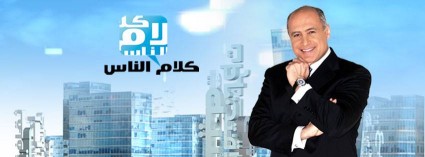 A court battle involving Lebanese talk show host C is proving to be the latest example of what free speech activists say is a growing crackdown by the government on public dissent.
A court battle involving Lebanese talk show host C is proving to be the latest example of what free speech activists say is a growing crackdown by the government on public dissent.
On Monday, in the case’s latest twist, a judge authorised the use of force to compel Mr Ghanem to appear in court on charges of insulting the ministry of justice, prompting the host’s lawyer to request the judge’s removal.
“He is the most famous TV host in Lebanon, so it is symbolic,” said Ayman Mhanna, the director of the SKeyes Centre, a media rights organisation in Beirut.
“But there is a trend since the election of the new president, bringing these charges under the veil of keeping things calm and maintaining stability. We have been working on this for the past few months, but now with Ghanem [and other cases], so many people have been arrested and interrogated. Many are just social media activists.”
Lebanon had been without a government for nearly two years before the election of president Michel Aoun late last year.
Mr Ghanem has hosted Kalam Ennas (Talk of the People), a popular weekly talk show on Lebanon’s LBC network, since 1995. The charges against him stem from an episode of the programme in early November, when two Saudi Arabian journalists expressed criticism of Mr Aoun and other members of Lebanon’s government.
Charges of insulting the president — a crime punishable by up to two years in prison — were brought against the two journalists. On his programme the following week, Mr Ghanem criticised the charges against his guests, which led to the charges against him.
“This really comes from outdated provisions in Lebanon’s law. Anything from criticising authorities to criticising the army or even criticising the flag or the cedars (Lebanon’s national symbol) can result in one to three years in prison,” said Bassam Khawaja, Human Rights Watch Lebanon and Kuwait researcher.
In a statement released on Tuesday, Boutros Harb, Mr Ghanem’s lawyer, accused the government of “silencing voices opposed to its policies.”
Mr Harb also called for the removal of the judge, Nicolas Mansour, on the grounds that Mr Mansour had failed to follow judicial procedure when Mr Harb attempted to deliver a preliminary defence for Mr Ghanem on Monday. Instead, Mr Mansour issued a subpoena for Mr Ghanem’s presence.
A subpoena issued on Monday calls for Mr Ghanem to appear in court by January 4.
A demonstration against the ongoing crackdown was planned for Thursday in front of the ministry of justice in Beirut.
“We have been planning this for the past few months, but now with Ghanem case and others, so many people have been arrested and interrogated. Many are just social media activists,” said Lina Hamdan, a spokeswoman for Forum Beirut, a group that is made up of representatives from a number of political parties and activist groups in Lebanon.
“Neither the [internal security forces] or the ministry of justice have been transparent,” Mr Khawaja said. “There have been an increase in prosecutions of freedom of speech, particularly in relation to social media.”
Mr Mhanna and Mr Khawaja said that there are defamation laws on the books in Lebanon, and that such charges, if warranted, should be made under those statutes.
Lebanon is widely considered to have the freest media environment in a region where jailing journalists is not uncommon.
According to the French NGO Reporters Without Borders, Turkey, Iran and Syria were three of the top five jailers of journalists worldwide in 2017. The New York-based Committee to Protect Journalists, which also compiles similar statistics, placed Egypt in its top five jailers of journalists for the year.
“Overall it’s not been a good year for freedom of expression in the Middle East,” Mr Khawaja said.
THE NATIONAL

Leave a Reply